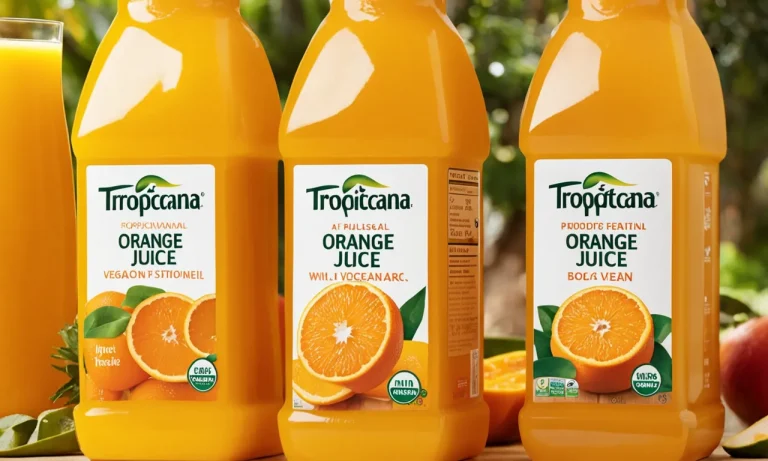Is Vitamin A Palmitate Vegan?
Reading ingredient labels is second nature to many vegans. Scanning for animal-derived components allows vegans to avoid undisclosed animal products in packaged foods and cosmetics. But one ingredient often raises eyebrows: vitamin A palmitate. Can this common additive be considered vegan?
If you’re short on time, here’s a quick answer to your question: Vitamin A palmitate can be vegan if it is sourced from lichens. However, it is sometimes derived from fish livers, making the source an important consideration for vegans.
What is Vitamin A Palmitate?
Vitamin A Palmitate is a form of vitamin A that is commonly used as an additive and supplement in various food and cosmetic products. It is a synthetic compound that is derived from a combination of retinol (animal-derived vitamin A) and palmitic acid.
This combination creates a stable and easily absorbable form of vitamin A that is widely used in the food industry.
A retinol form of vitamin A
Vitamin A Palmitate is a retinol form of vitamin A, which means that it is converted into retinol once it is ingested or applied to the skin. Retinol is an essential nutrient that plays a crucial role in various bodily functions, including maintaining healthy vision, supporting immune function, and promoting cell growth and development.
It is important to note that Vitamin A Palmitate is derived from animal sources, specifically from fish liver oil or other animal by-products. This fact raises concerns among individuals following a vegan lifestyle, as they typically avoid any products derived from animals.
Used as an additive and supplement
Vitamin A Palmitate is commonly used as an additive in various food products, including dairy alternatives, breakfast cereals, and margarine. It is added to these products to enhance their nutritional content and provide consumers with a source of vitamin A. Additionally, it is also used as a supplement in the form of capsules or tablets.
While Vitamin A Palmitate is widely used in the food industry, it is important for individuals following a vegan lifestyle to be aware of its origin. If you are avoiding animal-derived products, it is recommended to look for alternative sources of vitamin A, such as plant-based foods like carrots, sweet potatoes, and leafy green vegetables.
For more information on vegan-friendly alternatives to Vitamin A Palmitate, you can visit websites such as The Vegan Society or PETA.
Sources of Vitamin A Palmitate
Vitamin A palmitate is a form of vitamin A that is commonly used as a food additive and in dietary supplements. It is a synthetic form of vitamin A, which means it is not derived from natural sources like fruits and vegetables.
Instead, vitamin A palmitate is typically produced through chemical synthesis.
Fish liver oils
One of the traditional sources of vitamin A palmitate is fish liver oils, such as cod liver oil. These oils are rich in vitamin A and have been used for centuries as a natural source of this essential nutrient.
However, it is important to note that fish liver oils are not suitable for vegans as they are derived from animal sources.
Palm oil
Palm oil is another potential source of vitamin A palmitate. However, it is important to be cautious when considering the use of palm oil as a vegan source of this nutrient. While palm oil itself is derived from plants, the process of producing vitamin A palmitate from palm oil often involves the use of animal-derived ingredients or additives.
Therefore, it is essential to check the specific manufacturing process and sourcing of the vitamin A palmitate to determine if it is vegan-friendly.
Lichens
Lichens are a unique organism that consists of a symbiotic relationship between fungi and algae. Some lichens have been found to contain a naturally occurring form of vitamin A palmitate. This makes them a potential vegan source of this nutrient.
However, it is important to note that not all lichens contain vitamin A palmitate, and further research is needed to determine the availability and effectiveness of this source.
Considering Context and Labels
When it comes to determining whether Vitamin A Palmitate is vegan, it’s important to consider the context and labels associated with the product. While Vitamin A Palmitate can be derived from plant sources, it can also be sourced from animal products.
Source usually not listed on packaging
Unfortunately, the source of Vitamin A Palmitate is usually not listed on packaging, making it difficult for consumers to determine whether it is vegan or not. In most cases, the ingredient list will simply state “Vitamin A Palmitate” without specifying its origin.
This lack of transparency can be frustrating for individuals who follow a vegan lifestyle and want to make informed choices about the products they purchase.
It is important to note that even if the source of Vitamin A Palmitate is not listed, it doesn’t necessarily mean that it is derived from animal sources. In some cases, it may be derived from plant-based sources, making it suitable for vegans.
However, without clear labeling, it is challenging for consumers to be certain.
May be vegan in cosmetics but not supplements
Another aspect to consider is that Vitamin A Palmitate may be vegan in cosmetic products but not necessarily in dietary supplements. Cosmetics often use synthetic versions of Vitamin A Palmitate, which are typically derived from plant sources.
However, in dietary supplements, it is more common to find Vitamin A Palmitate derived from animal sources, such as fish liver oil.
It is essential for vegans to carefully read the labels and research the specific brand or product they are considering. Some companies may provide additional information on their website or have a vegan certification, which can help consumers make an informed decision.
When in doubt, consulting with a healthcare professional or reaching out to the manufacturer directly can provide clarity on whether Vitamin A Palmitate is vegan or not in a particular product.
Conclusion
While vitamin A palmitate can be vegan, its source needs careful evaluation. Since many companies don’t list sources, vegans need to research brands and call manufacturers to determine if vitamin A palmitate additives or supplements are animal-derived.







